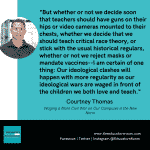The easiest student to teach is one that is eager to learn. An enthusiasm for school eases the difficult task teachers face of convincing students their education is worthwhile. While some students develop this naturally, the best way to foster intrinsic motivation in all students is done by demonstrating it yourself.
Educators, by nature, have an obligation to be lifelong students. A teacher’s abilities, like with any other profession, can be measured by their willingness to grow. Even young teachers who lack experience can thrive off determination. Without the desire to learn, the potential to teach declines.
For students, we categorize success mostly by comprehension. For teachers, mastery of a subject is not enough. To be an expert, teachers must be able to communicate that information in a number of ways.
Intellectual growth comes in all forms. For some, reading a book is their quickest path to understanding. For others, they require hands-on experiences. Every student yields a new style, including an infinite range of blended styles.
While every learning model has worth, few educational tools hold the same value as innovation. Teachers inspired to improve every year inevitably succeed.
The Pedagogy Buffet
With more than enough teaching models and classroom styles, it isn’t hard to feel overwhelmed when choosing which is best for you. Our gut tells us to use the methods taught to us, because, hey, it worked for us. But learners, in terms of needs, are like snowflakes: no two match perfectly.
You could continue standing up in front of the classroom to lecture, using old worksheets, droning through online assignments, or flipping through boring slideshows. You could…
But then there are student-led classrooms, model UNs, Socratic discussions, mock trials, business plans, short film production, and website creation, to name a few. It doesn’t matter what you use; strive to keep it fresh.
“Insanity is doing the same thing over and over again and expecting different results.”
-Anonymous
With this goal in mind, we make room for exponential growth–growth that can encompass students of every type. That’s the goal after all.
The more methods you try, the more that they will all begin to work, regardless of which you choose. Don’t let the opportunities remain a hanging possibility. Make them your constant reality. Try new methods. Cycle through them. See what works. The resources are out there.
Connecting with the Classroom
There is a broad spectrum of success and failure in education. As a teacher, It is what you do to move toward success that matters.
We can introduce the fanciest technologies into the classroom, buy the nicest textbooks, and even add classes like Video Game Design or Anime Appreciation, but if that eagerness to learn doesn’t exist, it’s hard to expect a robust learning environment to take place.
Sajan George, the Founder of Matchbox Learning, is someone who is often looking toward the future of education. He recognizes the importance of more advanced technology but reminds us of the incomparable strength of a good teacher. “Maybe we need both,” he says.
Regardless of the technology-to-instruction ratio in a classroom, George believes the key is using both to accomplish the most effective of all learning forms: individualization.
The ongoing process of meeting each student’s needs becomes increasingly possible when a savvy teacher is paired with a well-equipped classroom. Suddenly, when students feel their interests and needs are being considered, connections can be made like never before.
“If we don’t design a system that meets the needs of those children, we’ll never have a future education system that meets the needs of all children.”
-Sajan George
Leading by Example
Education, like technology, evolves over time. Teachers that are resistant to adapting are likely prolonging many difficulties for themselves. This is one of the biggest challenges we face as educators.
I’ve seen new teachers rely on old methods. I’ve seen veteran teachers try new methods I wouldn’t have dared attempt; yet, these valiant efforts managed to act as inspiration for me. I soon began to make similar efforts myself and continued searching for the perfect blend of instruction, paying close attention to what worked for each student.
Researchers at Eastern Washington University recognize the importance of teachers who take risks for the sake of education. Not only are they modeling positive behaviors for students through their innovation, they are demonstrating what it takes to conquer challenges.
These good examples, EWU says, are often picked up by students in the form of beneficial learning habits. Knowing how to answer your own questions through research or how to share your findings properly can add everlasting momentum to any student’s academic career.
To create these good examples, we must harness our own eagerness to learn. Ambition–when ignited in students and teachers alike–creates possibilities where there once seemed to be nothing.
“Teaching is not a static profession,” explains Dr. Van Wig. “Educators need to constantly challenge themselves to read and try new methods.”
Becoming a Lifelong Learner
Becoming a lifelong learner is as easy as knowing what your interests are, what you like to do, and being determined to succeed when things get tough. Don’t stop there though. Go beyond your comfort zone. Make new interests. Find new hobbies. Expand your horizons.
The ability to relate, says Betsy Ng, is a powerful thing. Students become engaged with little effort when the material becomes relatable. A little pop culture in your curriculum never hurt anything. This trait, Ng continues, along with teachers who offer challenges and teachers who demonstrate general competency, all make up the profile of a lifelong learner.
The only way to create lifelong learners as students is to be one yourself.
When students watch you evolve over the length of a semester, not only do they feel as if their education has value in the eyes of their teacher, they begin to transform into willing learners.
Accessing Untapped Potential
What we get from all these efforts of innovating, individualizing, and striving to achieve a growth mindset is a road to every student’s full potential. Discover the path yourself and it becomes that much easier to show your students the way.
Fail to make the attempt and students see nothing more than another run-of-the-mill classroom.
As Carol Dweck, intellectual creator of the mindset approach, reminds us: we fail to grow if we don’t give ourselves the opportunity to fail in the first place. If we figure out how to make failures a learning experience and not a defeating one, challenges become conquerable.
From students who take control of their education to students who persevere through difficulty, lifelong learning changes our perception of how we track progress. Effort becomes nothing but a display when there are no results, but the eagerness to learn alone improves the student-teacher dynamic.
As students’ learning trajectories begin to change, eventually, they will be able to fill gaps themselves as they are enabled to become autonomous learners–a useful skill when finally entering the world.
We don’t have students forever, but we can be students forever. The best thing we can do is teach our students to want the same thing by aiming high, to acknowledge the benefits of trial and error, and to value hard work as the key to their aspirations.
The aptitude for progress can be a contagious mentality when it is an honest intent, so learn what you love and teach with that same enthusiasm.






